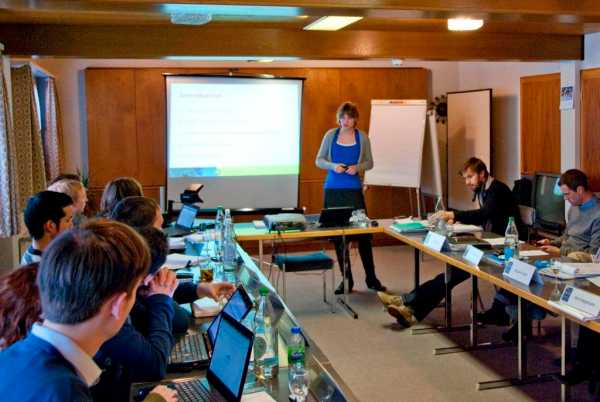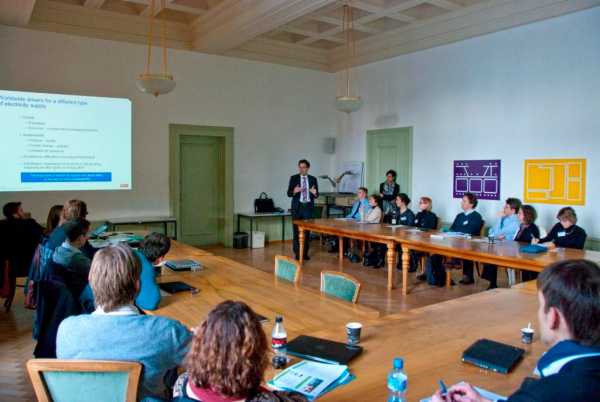ETH PhD Academy on Sustainability and Technology 2012
Technical Change towards a Low-Carbon Society – The Role of Institutions and Actors
The program is available for Download download (PDF, 504 KB)
January 29th – February 3rd, 2012, Appelzell, Swiss Federal Institute of Technology (ETH), Zurich (Switzerland)
Climate change and resource depletion are among the world’s biggest challenges of the 21st century. Mitigating these problems requires large-scale technical change. In order to decouple economic growth from its negative environmental consequences, new technologies such as clean energy technologies need to be developed and diffused at a pace much faster than “business as usual”.
Against this background, the fifth annual ETH PhD Academy on Sustainability and Technology is concerned with the role of institutions and actors – e.g. public policy or firms – for technical change towards a lowcarbon society. It provides a unique platform for PhD students with a background in innovation studies, management, economics or political sciences to present their research to an audience of like-minded students and four international faculty with a track record in research on innovation in the energy sector. Participants will obtain detailed feedback on their research design, theoretical approaches and methodology. In addition, there will be plenty of room for informal discussions and networking with other PhD students and professors.
Research of the participants focus on – but is not limited to – the following topics:
- Public policies for fostering low-carbon technologies
- Corporate technology and innovation strategies related to climate change
- Technological innovation systems in the context of climate change
- The role of developing countries in developing and diffusing low-carbon technologies
- Socio-technical assessment and forecasting of low-carbon technologie
For any additional questions please contact Timo Busch at .
Impressions

Anna Bergek is associate professor (docent) in Industrial Management at Linköping University in Sweden. Her research interests focus on the dynamics of industries and technological innovation systems, especially emergence of new innovation systems/industries and innovation within established innovation systems/industries. Within this overall frame, Anna is interested in firm level strategies in relation to technological discontinuities, new technological opportunities, innovation and new business development and in system-level issues, such as innovation and energy policy. Empirically, much of her research has been done within the energy field, with studies on e.g. renewable energy technologies, CCGT and lighting. Anna has published in journals such as Research Policy, Industrial and Corporate Change, Energy Policy and Technology Analysis & Strategic Management. She is currently a member of the Board of Management of the International Joseph A. Schumpeter Society.

Volker Hoffmann is an associate professor for sustainability and technology at the Department of Management, Technology, and Economics of ETH Zurich.
He received a diploma in chemical engineering from ETH Zurich in 1997 and a diploma in business administration from the University of Hagen, Germany, in 1999. In 1996/97 and 1999/2000 he worked as a visiting scholar and scientist at MIT where he investigated uncertainty propagation in large scale process models for the chemical industry (group of Gregory J. McRae). In 2001, he obtained his Ph.D. from ETH Zurich with a thesis on multi-objective decision making under uncertainty in chemical process design (group of Konrad Hungerbühler). Before joining the faculty of ETH Zurich in 2004, he was a project manager at McKinsey & Company where he worked in the chemical and electricity industry. He focused on strategy development for European utility companies, especially in the light of upcoming greenhouse gas regulations. During his career, Volker Hoffmann received several scholarships and awards including a German National Academic Foundation Scholarship (1994-97), an Ernest-Solvay-Scholarship (1996/97), and an Exchange Fellow Scholarship of the Alliance for Global Sustainability (1999/2000).
Volker Hoffmann's research at ETH Zurich centers on corporate strategies with respect to climate change, with a focus on climate policy and innovation. Recent research results are being published in journals such as the Journal of Management Studies, Global Environmental Change, Climate Policy, Energy Policy, the Journal of Industrial Ecology, the European Management Journal, Business Strategy & the Environment, Policy Sciences, Environmental Science & Policy, and Ecological Economics.

Margaret Taylor is a Project Scientist at Lawrence Berkeley National Laboratory (LBNL) and is affiliated with several units at the University of California, Berkeley, where she served from 2002-11 as an Assistant Professor with a primary appointment in the Goldman School of Public Policy (GSPP). Margaret has a broad interdisciplinary education and professional experience that bridges engineering, the social sciences, and the environmental sciences; her degrees are from Carnegie Mellon University and Columbia University. Margaret also has legal and Capitol Hill experience in the areas of international trade, energy, and the environment.
Margaret's research, which has won awards from the Academy of Management and the International Institute of Applied Systems Analysis, explores questions at the nexus of innovation and energy/environmental policy. She is particularly passionate about three cross-cutting research topics: (1) how the innovation process occurs in relation to policy efforts to address difficult public problems, in order to inform these efforts; (2) how to manage the risks of emerging technologies with significant potential public benefits; and (3) how to advance the resilience of large technical systems, given the pressures associated with rapid environmental and technological change. The problem of reducing greenhouse gas emissions to climate-stabilizing levels at affordable cost unifies much of her research.

Professor Jim Watson is Director of the Sussex Energy Group, University of Sussex. Jim has an MEng degree in engineering (Imperial College London) and a PhD in science and technology policy (Sussex). He has over 15 years’ research experience on energy, climate change and innovation policy. He frequently provides public policy advice in the UK and abroad, and has been a Specialist Adviser to two House of Commons select committees (2006-11). Jim has extensive international experience, including over ten years working on energy policies and scenarios in China. In 2008, he was a Visiting Scholar at the Kennedy School of Government, Harvard University. Jim was Chair of the British Institute for Energy Economics in 2011, and is a member of IPPR’s New Era Economics panel.
Supported by
- ABB
- EWZ
- Mercator Foundation Switzerland
- oikos Foundation
- Swiss National Science Foundation




